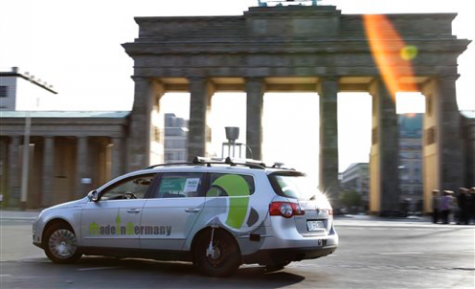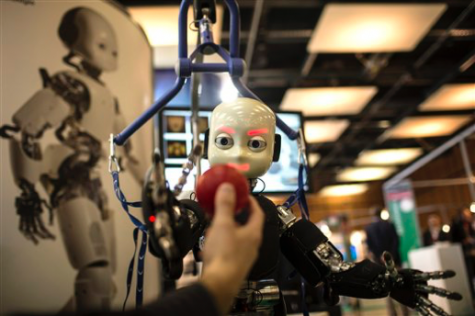Artificial Intelligence Raises Questions About Future
December 6, 2016
From emotion-reading apps to delivery drones, today’s world is quickly expanding to accept the concept of artificial intelligence.
Ever since the idea of artificial intelligence (AI) hit the news in 1955, it has been a controversial, and to some, frightening, topic. Discovered by Herbert Simon and Allen Newell, artificial intelligence has been defined as the power of a machine to copy intelligent human behavior. The mere thought of having machines that could possibly have an intelligence anywhere near that of a human’s is terrifying to many, scientists and civilians alike. But what truly is artificial intelligence? Are our fears well founded, or merely effects of modern mythology?

The concept of artificial intelligence has been around for some time. Its main purpose is to allow computers or other digital machines to be able to perform tasks that normally would require human intelligence to execute.
Artificial intelligence has been applied to many important jobs. Companies may now be relying on algorithms to evaluate possible employees and even decide who to hire. Artificial intelligence is what translates languages in Google Translate, it’s what answers the 1 billion questions that Siri gets asked every week, it’s what performs countless tasks that many may not even realize.
Another term closely related to artificial intelligence is machine learning.
Machine learning is a type of artificial intelligence, and it provides computers with the ability to learn and “grow” without needing to be programmed specifically. It was theorized in the 1950s, when Alan Turing, creator of the Turing test, proposed that a computer may be taught like a child. Machine learning is what is mostly being explored currently, with research centers creating computers that can analyze people’s fears and programs that can identify objects in images.
Ever since the term artificial intelligence was coined in 1955, it has been a widely studied and theorized topic. And that theory has not just been on the part of scientists.
Popular media was talking about artificial intelligence before it even existed, and AI’s conception certainly didn’t stop them. Author Isaac Asimov published iRobot, a collection of short stories that rocked the science fiction world, in 1950. The book has been praised for its influence on the science fiction genre, and although it was one of the first, it is far from the last. From 2001: A Space Odyssey to Ex Machina, the modern media can’t seem to get enough of artificial intelligence.
However, AI is often painted in a negative light. Movies and books frequently use artificial intelligence as the “villain” to be fought. Why society is so apprehensive about AI is a loaded question, and one many scientists strive to answer.
Many people fear artificial intelligence simply because it something they do not know or understand. However, when revolutionaries such as Stephen Hawking and Elon Musk begin to worry, it may be helpful to take notice.

“The development of full artificial intelligence could spell the end of the human race,” said Hawking in an interview with the BBC.
Hawking, who uses a simple form of AI to speak, is concerned that a fully functioning and intelligent electric mind could easily surpass the human race. Due to the slow slow process of biological evolution, humans would not be able to keep up with radically growing artificial intelligence.
The fear of being superseded by robots is one shared by many in the science community, but there are other concerns regarding AI.
One of these concerns is the morality of human use of artificial intelligence. With the invention of self-driving cars, people have to ask “Who is more important in a car crash: the passenger, or any pedestrians that may be hurt?”
It’s these questions that daunt researchers and may not ever really be answered. When we create algorithms to make the hiring process easier, may we be unconsciously implementing our own biases into them, therefore nullifying their very purpose? However, these questions must be asked when thinking about society’s future with artificial intelligence.







